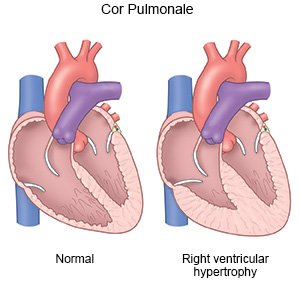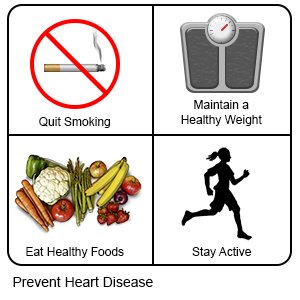Cor Pulmonale
Medically reviewed by Drugs.com. Last updated on Apr 6, 2025.
Cor pulmonale is a condition that occurs when the right ventricle of your heart cannot pump properly. The right side of your heart pumps blood from your body into your lungs to get oxygen. Cor pulmonale is caused by pulmonary hypertension (PH). PH is high blood pressure in the arteries of your lungs. Blood cannot flow through your lungs and backs up in the right ventricle of your heart. As the right ventricle tries to pump blood properly, it becomes thickened and deformed. Cor pulmonale can become life-threatening.
 |
DISCHARGE INSTRUCTIONS:
Call your local emergency number (911 in the US) if:
- You cough up blood.
- You have chest pain that does not go away with rest.
- You have severe shortness of breath.
- Your hands or feet suddenly feel cold to the touch.
- Your heart is beating faster than normal for you.
Call your doctor if:
- You are more tired than usual.
- You are urinating much less than what is normal for you.
- You feel dizzy, lightheaded, or confused.
- You have new or increased swelling in your abdomen, legs, or feet.
- You are more short of breath or wake from sleep gasping for air.
- You have questions or concerns about your condition or care.
Medicines:
- Diuretics are given to decrease excess fluid that collects in a part of your body, such as your legs. Diuretics can also remove excess fluid from around your heart or lungs and decrease your blood pressure. It is often called water pills. You will urinate more often when you take this medicine.
- Heart medicine may be given to strengthen or regulate your heartbeat. It also may help your heart in other ways. Talk with your healthcare provider to find out the name of your heart medicine.
- Vasodilators may improve your blood flow by making the blood vessels in your heart and lungs wider. This may decrease the pressure in your blood vessels and improve your symptoms.
- Bronchodilators are given to relax the airways in your lungs and help you breathe better.
- Blood thinners help prevent blood clots. Clots can cause strokes, heart attacks, and death. Many types of blood thinners are available. Your healthcare provider will give you specific instructions for the type you are given. The following are general safety guidelines to follow while you are taking a blood thinner:
- Watch for bleeding and bruising. Watch for bleeding from your gums or nose. Watch for blood in your urine and bowel movements. Use a soft washcloth on your skin, and a soft toothbrush to brush your teeth. This can keep your skin and gums from bleeding. If you shave, use an electric shaver. Do not play contact sports.
- Tell your dentist and other healthcare providers that you take a blood thinner. Wear a bracelet or necklace that says you take this medicine.
- Do not start or stop any other medicines or supplements unless your healthcare provider tells you to. Many medicines and supplements cannot be used with blood thinners.
- Take your blood thinner exactly as prescribed by your healthcare provider. Do not skip a dose or take less than prescribed. Tell your provider right away if you forget to take your blood thinner, or if you take too much.
- Take your medicine as directed. Contact your healthcare provider if you think your medicine is not helping or if you have side effects. Tell your provider if you are allergic to any medicine. Keep a list of the medicines, vitamins, and herbs you take. Include the amounts, and when and why you take them. Bring the list or the pill bottles to follow-up visits. Carry your medicine list with you in case of an emergency.
Follow up with your doctor as directed:
You may need more tests to check to see if your treatment is working. Write down your questions so you remember to ask them during your visits.
Self-care:
- Limit your liquids as directed. Ask your healthcare provider how much liquid you should drink each day. Too much liquid can increase your risk for swelling and make your cor pulmonale worse.
- Eat healthy foods. You may need to change what you eat to control your symptoms. Foods that are low in salt are best. Healthy foods include fruit, vegetables, whole-grain breads, low-fat dairy products, beans, lean meat, and fish.

- Maintain a healthy weight. Talk to your healthcare provider about the best plan for you. You may not be able to do certain exercises.
- Prevent pregnancy if you are a woman. During pregnancy, your heart needs to work harder than usual. Pregnancy may be life-threatening to both you and your baby. Talk with your healthcare provider about safe ways to prevent pregnancy.
- Do not drink alcohol. Alcohol can make it harder for you to breathe, and can worsen your cor pulmonale. Talk with your healthcare provider if you drink alcohol and need help to stop.
- Do not smoke. If you smoke, it is never too late to quit. Tobacco smoke can make your heart and lung symptoms worse. It can also cause heart and lung disease. Ask your healthcare provider for information if you need help to stop smoking.

© Copyright Merative 2025 Information is for End User's use only and may not be sold, redistributed or otherwise used for commercial purposes.
The above information is an educational aid only. It is not intended as medical advice for individual conditions or treatments. Talk to your doctor, nurse or pharmacist before following any medical regimen to see if it is safe and effective for you.
Learn more about Cor Pulmonale
Treatment options
- Medications for Cor Pulmonale
- Medications for Pulmonary Arterial Hypertension
- Medications for Pulmonary Embolism
- Medications for Pulmonary Heart or Vascular Disease
- Medications for Pulmonary Thromboembolism
Care guides
Medicine.com guides (external)
Further information
Always consult your healthcare provider to ensure the information displayed on this page applies to your personal circumstances.
